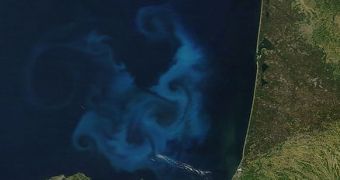A study carried out by marine ecologist Daniel Boyce, of Dalhousie University in Halifax, Canada, appearing this week in the journal Nature, pulls the alarm handle on the decline of phytoplankton. In the last century, phytoplankton started dying at a fast rate, and since 1950, 40 percent of the phytoplankton around the globe has disappeared.
Boyce says that phytoplankton represents half of the world’s plants and its disappearance will destroy the climate's fragile balance, that between the animals of the oceans and ultimately every living thing in the seas. “It's hard to really imagine phytoplankton could be so important because most people don't see them in their daily lives. They're microscopic and they live out at sea. But everything that happens to them affects the entire marine food chain, including us.”
The oceans have already started to turn from green to blue because of the decline in phytoplankton, but to get more precise results, Boyce and his team collected a half-million measurements of ocean clarity from a public data set dated back to 1899.
These analysis showed that over more than the last hundred years phytoplankton levels have dropped by one percent each year, in eight of the ten big ocean regions. The biggest phytoplankton decline was around the poles, near the equator and in the open oceans.
“It's really big, said David Siegel, marine scientist at the University of California, Santa Barbara. “I'm a little leery about how big that number is.”
Scientists do not know for sure what is causing the mass death of the phytoplankton, but they think that the global warming might be one of the reasons. They observed that the decline was much higher in areas where the surface of the sea has warmed the most. The ocean's warming is a phenomenon that restrains the amount of nutrients that can get from the depths to the surface, and phytoplankton need the nutrients for survival.
This also influences the food chain because with less phytoplankton, fish have less to eat, fishermen will have less to fish and people will eat less fish. Phytoplankton takes up the carbon dioxide and absorbs the heat, specifies Discovery News.

 14 DAY TRIAL //
14 DAY TRIAL //